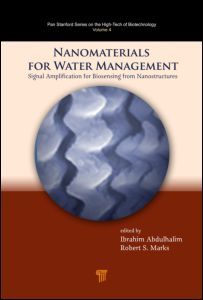Nanomaterials for Water Management Signal Amplification for Biosensing from Nanostructures Jenny Stanford Series on the High‐Tech of Biotechnology Series
Coordonnateurs : Marks Robert S., Abdulhalim Ibrahim

The interest in finding reliable and highly sensitive sensors for water quality control has grown recently empowered by the explosion of cutting-edge technologies such as nanotechnologies, optoelectronics, and computing on one hand and by the increasing need for more secure control of water quality on the other hand. This book highlights a number of modern topics in the field of biosensing particularly for water sensing in which the signal is enhanced, starting from surface enhanced spectroscopies using plasmonic structures such as Raman scattering (SERS), infrared enhanced absorption (SEIRA), and surface enhanced fluorescence (SEF).
The SPR enhanced detection is highlighted in two chapters and addressed using signal processing and the use of color of solutions as a result of modification of the LSPR properties of nanoparticles. Porous materials are another field of research where the enhancement is achieved due to the increasing the area- to-volume ratio. Good examples are the two emerging fields of porous Si and sculptured thin films prepared by the oblique deposition technique. One of the long standing problems is bacteria detection in water which is addressed thoroughly with emphasis on the problems usually encountered in detecting large bioentities.
Nanoplasmonic structures and enhanced spectroscopies for water sensing. Online and real-time water quality monitoring system based upon Raman super-resolved spectrometer. Application of broadband infrared plasmon resonance for the signal amplification of analytes in water. Colorimetric detection of toxic metal ions in water based on gold nanoparticles. Tackling the SNR problem in miniaturized arrayed biosensors for water. Current techniques for bacteria and large entities detection in water. Techniques for signal analysis in surface plasmon resonance sensors. Chemical sensing and biosensing with nanostructured porous silicon. Chiral sculptured thin films for optical sensing of analytes in fluids.
Ibrahim Abdulhalim is a professor in the Department of Electrooptic Engineering at Ben Gurion University. He has worked in research and development in a variety of academic institutions and industrial companies. From August 1988 till May 1991, he was a research associate within the Optoelectronic Computing Systems Center in the University of Colorado at Boulder, USA where he worked on ferroelectric liquid crystal spatial light modulators. During July 1991 till July 1993 he was a research fellow in the Optoelectronics Research Center of Southampton University, England, working on fiber acousto-optic modulators for Q-switching and Mode-locking of fiber lasers. During 2000-2001 he was with the Thin Films Center of the University of Western Scotland as a researcher and lecturer. Among the companies he worked for are KLA-Tencor and Nova measuring instruments working in optical metrology systems for the inspection of the fabrication processes in the microelectronics industry and in GWS-Photonics working on guided wave liquid crystal devices for the optical telecommunications. Since October 2005 he joined the Department of Electrooptic Engineering at Ben Gurion University. His current research activities involve liquid crystal devices, nanophotonic and plasmonic structures for biosensing, improved biomedical optical imaging techniques such as spectropolarimetric imaging and full field optical coherence tomography using liquid crystal devices. Prof. Abdulhalim has published over 120 journal articles, 60 conference proceedings papers, 10 book chapters, coauthored 1 book titled Integrated Nanophotonic Devices (Micro and Nano Technologies), and has 10 patents. He became a fellow of the Institute of Physics, UK in 2004 and SPIE fellow in 2010. He is an associate editor of the SPIE Journal of NanoPhotonics and for the Journal of Physics Express. Prof. Abdulhalim is acting as the head of Department of Electrooptic Engineering since 2007.<
Date de parution : 08-2015
15.2x22.9 cm
Disponible chez l'éditeur (délai d'approvisionnement : 15 jours).
Prix indicatif 142,05 €
Ajouter au panierThèmes de Nanomaterials for Water Management :
Mots-clés :
LSPR Property; gold; Form Duplex DNA; nanoparticles; ATR IR Spectrum; plasmon; SPR Sensor; resonance; SERS Measurement; nanyang; SERS Substrate; technological; Raman Spectroscopy; university; DNA Chain; localized; LSPR; signal; SERS Intensity; amplification; SPR Signal; SEM Image; Cfu mL-1; CSTF; SERS Sensitivity; DNA Gold Np; Porous Silicon; Nanostructured Porous Silicon; SERS Performance; Gold NPs; Binding Site Density; Spp Wave; LSPR Wavelength; SERS Signal; SERS



